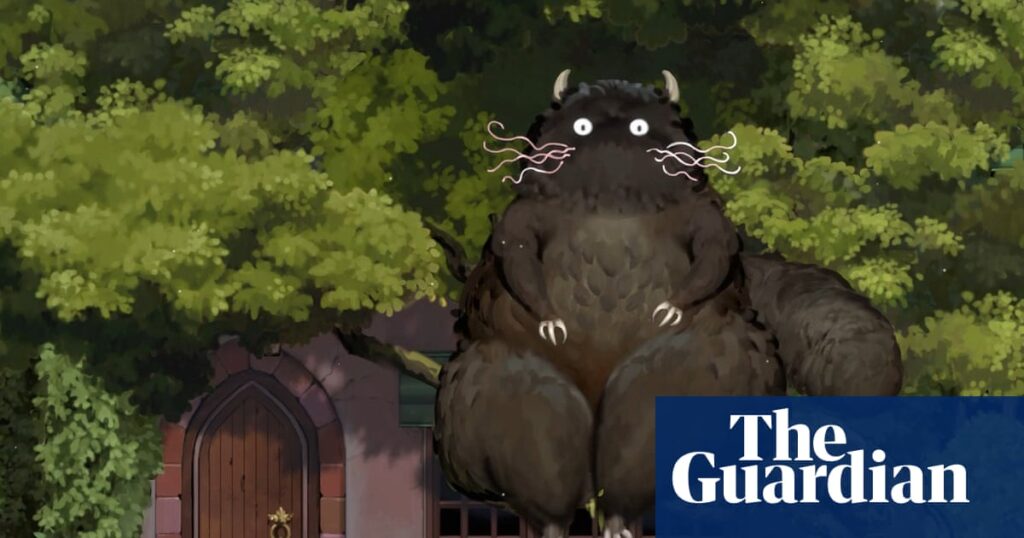With dulcet Welsh tones, an actor bearing an uncanny aural resemblance to Michael Sheen introduces players to the world of Mandrake. The village of Chandley is “small” and “complicated”, he says warmly. “Everyone’s got their own story.” The action cuts between cosy, wooden cottages and a moss-covered forest filled with folkloric creatures. We see the protagonist, a horticulturist wizard “steeped in the green and growing arts”, returning home and tending to an abundance of vegetables. Some you’ll find in your local supermarket; others are of a decidedly more magical variety.
As a rural life simulation, Mandrake is odder and more beguiling than most. It possesses the same undeniable allure as classics such as Harvest Moon and Stardew Valley, inviting players to slip into the seasonal flow of crop cultivation, countryside exploration and conversations with suspiciously cheerful townsfolk. But there’s more going on here: lush, painterly visuals to start. And should you tire of tilling the soil, you might wander off the beaten path of this mythical, Brythonic-inspired land, perhaps eavesdropping on the dead or even befriending a river.
Weirdness is to be expected in a new release from Failbetter, the boutique UK studio behind acclaimed titles Fallen London and Sunless Sea. Set in a shared fictional universe, that narrative RPG and moody survival experience, respectively, were masterclasses in evocative prose and captivating world-building. London became “Fallen”, submerged in a darkened underworld called the Neath, newly situated on the coast of a vast, black ocean – the so-called Unterzee.
These games, horrifying and hilarious in nearly equal measure, were rooted in a deft sense of place. Mandrake foregrounds location in a friendlier, more accessible way. The beauty of the rural life sim, as game director Adam Myers sees it, is that “you’re able to zoom in on one community over time”. Across days, nights and seasons, the player bears witness to a changing place and its people. You go from a sense of total unfamiliarity, says Myers, to having developed a deep knowledge of the environment.
But Mandrake aims to eschew the genre’s grindier tendencies – cultivating acres of wheat and making multiple daily meals. “It isn’t optimal to grow your crops in large rectangular monocultures,” says Myers. “And you’re not doing the thing where you click 30 times and carry a banquet’s worth of ratatouille around in your inventory at all times.”
Gift-giving, the typical way players ingratiate themselves with their NPC neighbours in this genre, arrives with a wrinkle. Players cannot just hand out presents randomly (“That’s a little awkward,” laughs Myers). Instead, they must declare why they are handing out their offerings. This forms the start of a relationship based on obligation.
The aim is to not just replicate the pattern seen in other rural life sims, but “complicate” it, both through thoughtful mechanics and an unusual set of influences. Myers talks enthusiastically of anthropology, British folklore and esoteric traditions such as Renaissance alchemy. The world is filled with quirky and mysterious lore: it is inhabited by “quasi-monastic organisations” and despite the Welsh influences in the landscape, there is an eerie absence of sheep.
The comforting rituals of the rural life sim seem to function as a Trojan horse for Failbetter’s peculiar and offbeat tendencies. “One of the error patterns we’ve fallen into in the past is going too weird, too fast, too soon,” admits Myers. “We need to give players more stable ground to stand on so they can make sense of everything – put the pieces together to properly appreciate what’s unusual and strange.”
Ominous creatures undoubtedly lurk in these ancient woods; villagers are likely to conceal many portentous secrets. It’s reasonable to assume that Myers’s and his colleagues’ taste for the macabre surfaces in some manner. But there’s a crucial difference, a concession, perhaps, to maintaining what he hopes is a welcoming and “emotionally gentle” tone: unlike some of Failbetter’s other games, death doesn’t lurk quite so close to your shoulder. Or as Myers puts it, “you probably won’t be able to get yourself eaten in this one”.

